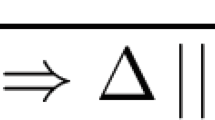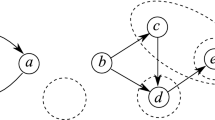Abstract
This paper contributes to the principled construction of tableau-based decision procedures for hybrid logic with global, difference, and converse modalities. We also consider reflexive and transitive relations. For converse-free formulas we present a terminating control that does not rely on the usual chain-based blocking scheme. Our tableau systems are based on a new model existence theorem.
Similar content being viewed by others
References
Areces C., ten Cate B. (2007) Hybrid logics. In: Blackburn P., Benthem J., Wolter F. (eds) Handbook of modal logic, Volume 3 of Studies in logic and practical reasoning.. Elsevier, New York, pp 821–868
Baader F., Lutz C. (2007) Description logic. In: Blackburn P., Benthem J., Wolter F. (eds) Handbook of modal logic, Volume 3 of Studies in logic and practical reasoning.. Elsevier, New York, pp 757–820
Balbiani, P., & Demri, S. (1997). Prefixed tableaux systems for modal logics with enriched languages. In A. L. Ralescu & J. G. Shanahan (Eds.), Proceedings 15th international joint conference on artificial intelligence (IJCAI’97) (pp. 190–195.) Morgan Kaufmann.
Blackburn P., de Rijke M., de Venema Y. (2001) Modal Logic. Cambridge University Press, Cambridge
Bolander T., Blackburn P. (2007) Termination for hybrid tableaus. Journal of Logic and Computation, 17(3): 517–554
Bolander T., Braüner T. (2006) Tableau-based decision procedures for hybrid logic. Journal of Logic and Computation, 16(6): 737–763
de Rijke M. (1992) The modal logic of inequality. Journal of Symbolic Logic, 57(2): 566–584
Farmer W.M. (2008) The seven virtues of simple type theory. Journal of Applied Logic, 6(3): 267–286
Fitting M. (2007) Modal proof theory. In: Blackburn P., Benthem J., Wolter F. (eds) Handbook of modal logic, Volume 3 of Studies in logic and practical reasoning.. Elsevier, New York, pp 85–138
Gargov G., Goranko V. (1993) Modal logic with names. Journal of Philosophical Logic, 22: 607–636
Gargov, G., Passy, S., & Tinchev, T. (1987). Modal environment for Boolean speculations (preliminary report). In D. G. Skordev (Ed.), Mathematical logic and its applications: Proceedings of an advanced international summer school and conference in honor of the 80th anniversary of Kurt Gödel’s birth (pp. 253–263). Plenum Press.
Halpern J. Y., Moses Y. (1992) A guide to completeness and complexity for modal logics of knowledge and belief. Artificial Intelligence, 54: 319–379
Hardt M., Smolka G. (2007) Higher-order syntax and saturation algorithms for hybrid logic. Electronic Notes in Theoretical Computer Science, 174(6): 15–27
Hintikka K.J.J. (1955) Form and content in quantification theory. Two papers on symbolic logic. Acta Philosophica Fennica, 8: 7–55
Horrocks I., Hustadt U., Sattler U., Schmidt R. (2007) Computational modal logic. In: Blackburn P., Benthem J., Wolter F. (eds) Handbook of modal logic, Volume 3 of Studies in logic and practical reasoning.. Elsevier, New York, pp 181–245
Horrocks I., Sattler U. (1999) A description logic with transitive and inverse roles and role hierarchies. Journal of Logic and Computation, 9(3): 385–410
Horrocks I., Sattler U. (2007) A tableau decision procedure for SHOIQ. Journal of Automated Reasoning, 39(3): 249–276
Hughes G.E., Cresswell M.J. (1968) An introduction to modal logic. Methuen, London
Kaminski, M., & Smolka, G. (2008). Terminating tableaux for hybrid logic with the difference modality and converse. In A. Armando, P. Baumgartner, & G. Dowek (Eds.), IJCAR 2008, Vol. 5195 of LNCS (LNAI) (pp. 210–225). Springer.
Kaminski, M., & Smolka, G. (2009). Hybrid tableaux for the difference modality. In C. Areces & S. Demri (Eds.), Proceedings of the 5th workshop on methods for modalities (M4M5 2007), Vol. 231 of Electronic Notes in Theoretical Computer Science (pp. 241–257). Elsevier.
Kripke S.A. (1963) Semantical analysis of modal logic I: Normal modal propositional calculi. Zeitschrift für Mathematische Logik und Grundlagen der Mathematik, 9: 67–96
Author information
Authors and Affiliations
Corresponding author
Rights and permissions
About this article
Cite this article
Kaminski, M., Smolka, G. Terminating Tableau Systems for Hybrid Logic with Difference and Converse. J of Log Lang and Inf 18, 437–464 (2009). https://doi.org/10.1007/s10849-009-9087-8
Received:
Published:
Issue Date:
DOI: https://doi.org/10.1007/s10849-009-9087-8




